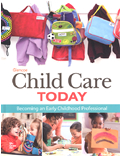
Child Care Today ©2012Chapter 13: Family Program PartnershipsChapter SummaryEach child care program should have a family relations philosophy to govern how families should be treated and included in the program. Welcome family members warmly and use frequent, positive interactions. Staff members communicate with families in a variety of ways. Teachers schedule parent-teacher conferences to discuss child development. An open door policy encourages families to visit and builds trust. Families can be involved in child care centers according to their own interests and time available. Early childhood staff can help connect families to community services. Referrals are often made to specialists in certain types of care. Typical referrals may be for nutrition education, family therapy, financial assistance, child development services, and medical referrals. Follow basic steps to solve problems or differences of opinion between staff and families. The National Association for the Education of Young Children’s (NAEYC’s) Code of Ethics can provide guidance. Program staff must be aware of legal duties concerning families. Licensing laws address specific legal issues related to custody rights. Details on referrals must be recorded in the child’s file, and referrals must be kept confidential. |  |















